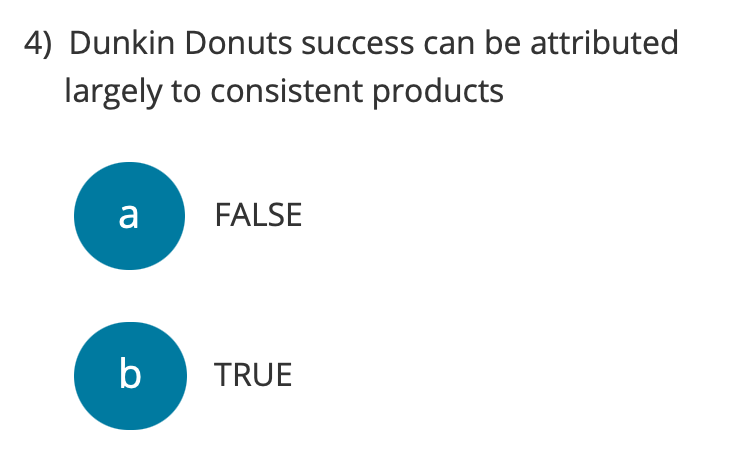Impact and Response
The Dunkin’ Donuts boycott, while not reaching the scale of some other major consumer movements, had a noticeable impact on the company and its public image. Its effectiveness in achieving specific objectives, however, is debatable, depending on the specific goals of the boycott organizers.
The boycott sparked a conversation about various issues, including labor practices, ethical sourcing, and environmental concerns. This heightened awareness led to increased scrutiny of Dunkin’ Donuts’ operations and policies.
Public Perception and Media Coverage
The boycott garnered significant media attention, with news outlets covering the protest and its motivations. Social media platforms also saw increased engagement, with users discussing the boycott and sharing their perspectives on the issues at hand. The media coverage helped amplify the message of the boycott, reaching a wider audience and raising awareness about the concerns of the organizers.
The public perception of Dunkin’ Donuts was impacted, with some consumers expressing their support for the boycott and choosing to avoid the chain. However, it’s crucial to note that the boycott did not lead to a widespread or lasting decline in Dunkin’ Donuts’ customer base.
Dunkin’ Donuts’ Response, Dunkin donuts boycott rumble
Dunkin’ Donuts responded to the boycott by issuing statements addressing the concerns raised by the organizers. They also engaged in dialogue with some of the boycott’s leaders, aiming to clarify their policies and practices. While the company did not make any major concessions or policy changes in direct response to the boycott, the increased scrutiny may have contributed to internal discussions about sustainability and labor practices.
Consumer Behavior and Brand Loyalty
The boycott had a mixed impact on consumer behavior and brand loyalty. Some consumers who were previously loyal to Dunkin’ Donuts shifted their coffee purchases to other chains or independent coffee shops in solidarity with the boycott. However, for many consumers, the boycott did not significantly alter their purchasing habits. The long-term impact on brand loyalty is difficult to assess, as it is likely influenced by a range of factors beyond the boycott.
Long-Term Implications and Lessons Learned: Dunkin Donuts Boycott Rumble

The Dunkin’ Donuts boycott, though a significant event, did not result in a dramatic decline in the company’s sales or a permanent shift in consumer behavior. However, it did leave a lasting impact on the company’s public image and fueled broader discussions about corporate responsibility and consumer activism. The boycott served as a catalyst for change, prompting Dunkin’ Donuts to re-evaluate its practices and consumers to become more aware of their purchasing power.
Long-Term Impact on Dunkin’ Donuts
The boycott, while not a complete success in terms of permanently impacting Dunkin’ Donuts’ sales, did force the company to acknowledge and address the concerns of its customers. The company’s response, including public apologies and promises of change, demonstrated its willingness to engage with the concerns raised by the boycott. This engagement, in turn, helped to mitigate some of the negative publicity associated with the boycott. While Dunkin’ Donuts did not experience a dramatic decline in sales, the boycott served as a wake-up call, prompting the company to prioritize its public image and corporate responsibility.
Societal Implications of the Boycott Movement
The Dunkin’ Donuts boycott exemplified the growing power of consumer activism and its ability to influence corporate behavior. The boycott demonstrated that consumers are increasingly willing to use their purchasing power to voice their concerns about corporate practices. This shift in consumer behavior reflects a growing awareness of the impact of individual choices on the larger societal and environmental landscape. The boycott also highlighted the importance of social media in amplifying consumer voices and mobilizing collective action.
Lasting Changes in Corporate Practices or Consumer Activism
The Dunkin’ Donuts boycott, along with other similar consumer-led movements, has led to a greater emphasis on corporate social responsibility. Corporations are increasingly aware of the need to address ethical and environmental concerns in their operations. This awareness has translated into changes in corporate practices, such as increased transparency, ethical sourcing, and sustainability initiatives. Consumers, on the other hand, have become more discerning in their purchasing decisions, actively seeking out brands that align with their values.
Lessons Learned from the Boycott
The Dunkin’ Donuts boycott offers valuable lessons for both corporations and consumers. For corporations, the boycott underscores the importance of being responsive to consumer concerns and actively engaging with criticism. It also highlights the need for transparency and accountability in corporate practices. For consumers, the boycott demonstrates the power of collective action and the importance of using their purchasing power to advocate for change. The boycott also underscores the need for informed decision-making, based on a clear understanding of corporate practices and their impact on society.
Dunkin donuts boycott rumble – The Dunkin’ Donuts boycott rumble is a testament to the power of social media, and its ability to mobilize people around a cause. It’s a reminder that boycotts can be a powerful tool for change, just like the way the climbing community is mobilizing around the climbing Olympics 2024.
It’s a new era for the sport, and the energy around it is palpable. This kind of passionate engagement is exactly what we need to see more of in the world, and it’s a reminder that even the seemingly small acts of protest can have a big impact.
